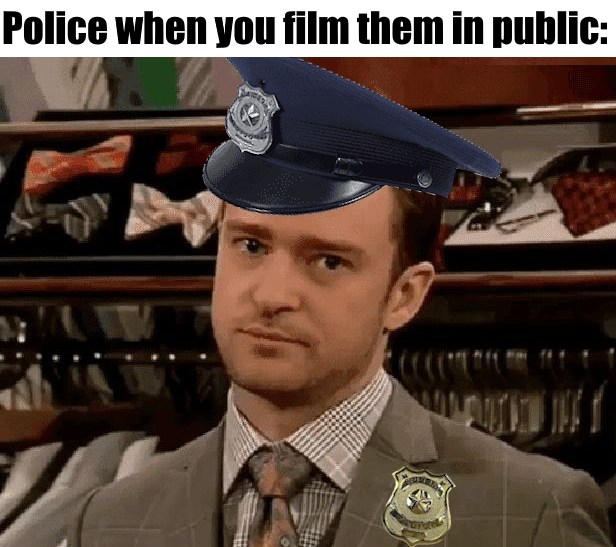this post was submitted on 08 Oct 2023
1 points (100.0% liked)
Memes
45734 readers
495 users here now
Rules:
- Be civil and nice.
- Try not to excessively repost, as a rule of thumb, wait at least 2 months to do it if you have to.
founded 5 years ago
MODERATORS
you are viewing a single comment's thread
view the rest of the comments
view the rest of the comments

Why
Great question! If it's illegal to film a public servant then it is illegal to verify they are actually serving the public's best interest. In particular if you catch a public servant performing amoral or otherwise corrupt behaviour there is no way to publicaly verify that. Further without explicit legal protections for things then it is easier for that action to be banned or otherwise made illegal. No protection is no protection. A corrupt public servant has a vested interest in misinterpreting law in order to prevent you from exposing them. Which is why Oklahoma's ban on filming police is still bad even though it is framed under the guise of protecting police from harassment
I don't think broad brushstrokes are helpful here - regular people can be real assholes, and we need to balance a public servant's individual right to privacy with the public's right to transparency.
Some jobs such as Police Officers, I have no qualms with filming while they're in uniform or otherwise on-the-job. But I can also see how a blanket approval could backfire, e.g. some aggrieved person decides to stalk some poor guy who's only job is to center divs on some government website, just because they find out he's a government worker.
I can see that but at the same time, there's a difference between public servants doing their job in public versus just being an office worker working. I don't think people are arguing that office workers need to be recorded by the public, as that would be quite weird. Although at the same time, people generally argue that police officers should be recorded, even by people in private, but I think that's more due to the fact that they have authority that can be abused in ways that office workers simply aren't able to.
No we mean the office workers too, if they're public servants. There's an epidemic going on in the US right now of city employees withholding forms and public resources in favor of helping the police cover up their misconduct.
Uncomfortable as though it may be, it's necessary for accountability.
I'm not sure that spying on office workers is a good idea, potentially even ones working remotely too. Not only would that not be illegal but ethically it feels wrong. I feel like people should be entitled to privacy when in their own home.
I get the concern, believe me. If it weren't absolutely necessary (IMO) I wouldn't be suggesting it.
But doesn't it feel ethically wrong that people are having their civil rights violated by corrupt city officials and their cohorts?
Think about what a difference body cams made for police conduct. It's more difficult to abuse any power you hold when you can be held accountable for it
I'm not sure violating privacy rights is the way to go about restoring civil rights.
Body cams are because police have authority and are interacting with the public. Office workers working on information that is often likely PII, thus violating the privacy right of citizens too, and violating the privacy rights of office workers in the name of civil rights still doesn't really sit right with me.
This is where our disagreement won't be reconciled. There is no expectation of privacy in public. Until the Supreme Court overturns their decision this is not the public's problem.
State employees at any level have authority to abuse, it's just a very large range.
For example, there have been known cases of county clerk employees refusing to file FOIA requests on completely fabricated precedent. If I'm being charged with something, there should not be any barrier between me and the public records that exonerate me.
This example is just the tip of the iceberg.
Edit: Also just because I failed to bring this up, I wanna add something about this:
When you FOIA request records, they're always going to have a chance to censor private information. This comes up all the time with license plates and address on IDs in bodycam footage. It's the same thing.
You are right, we won't be able to agree on this.
I guess I disagree that an office, or someone's home office is considered a public space.
State employees aren't actively gunning people down in the streets, unless they are cops. I think it's a very big difference. I think you need the accountability that a body cam provides on someone who can literally end lives in seconds.
(15) Public official
The term "public official" means any elected official, appointed official, or employee of- (A) a Federal, State, or local unit of government in the United States other than- (i) a college or university; (ii) a government-sponsored enterprise (as defined in section 622(8) of this title);
https://uscode.house.gov/view.xhtml?req=%28title:2%20section:1602%20edition:prelim
I'm not intending this as a 'gotchya', I'm arguing that these are public servants that handle matters of public interest. The location is not important to me, and other than this fringe 'remote' case we're talking about public, tax-funded buildings.
And I believe that you need accountability for people that can withhold records that could potentially save you from a life of false imprisonment. To me this is not a significant enough of a difference for me to feel the need to justify it.